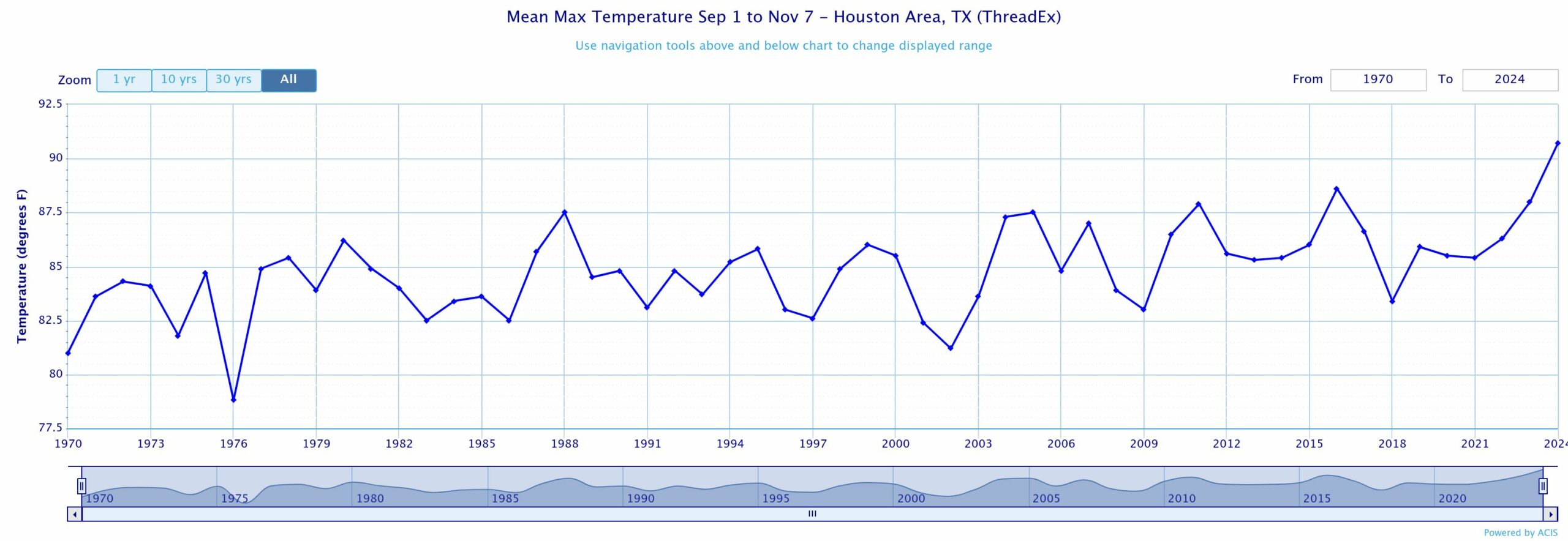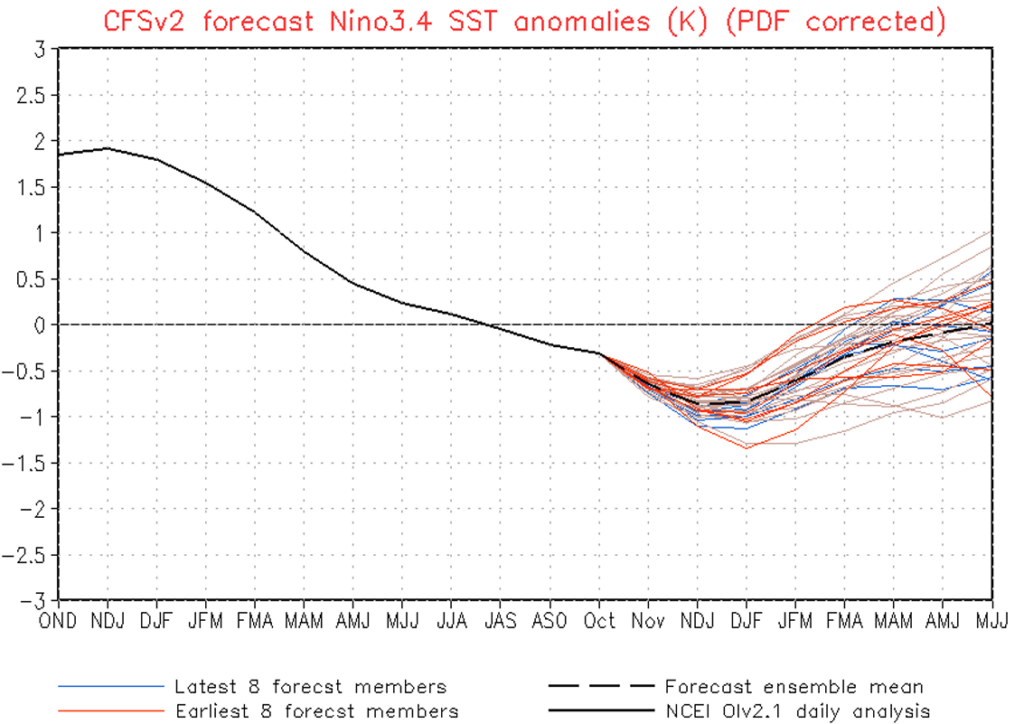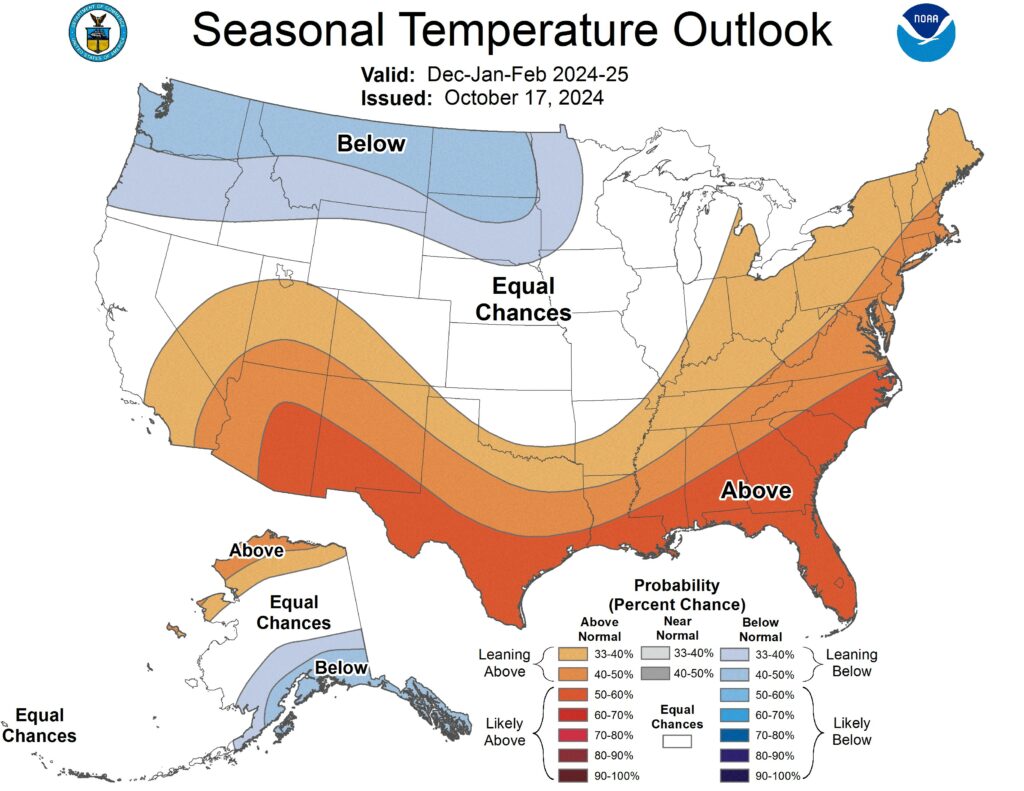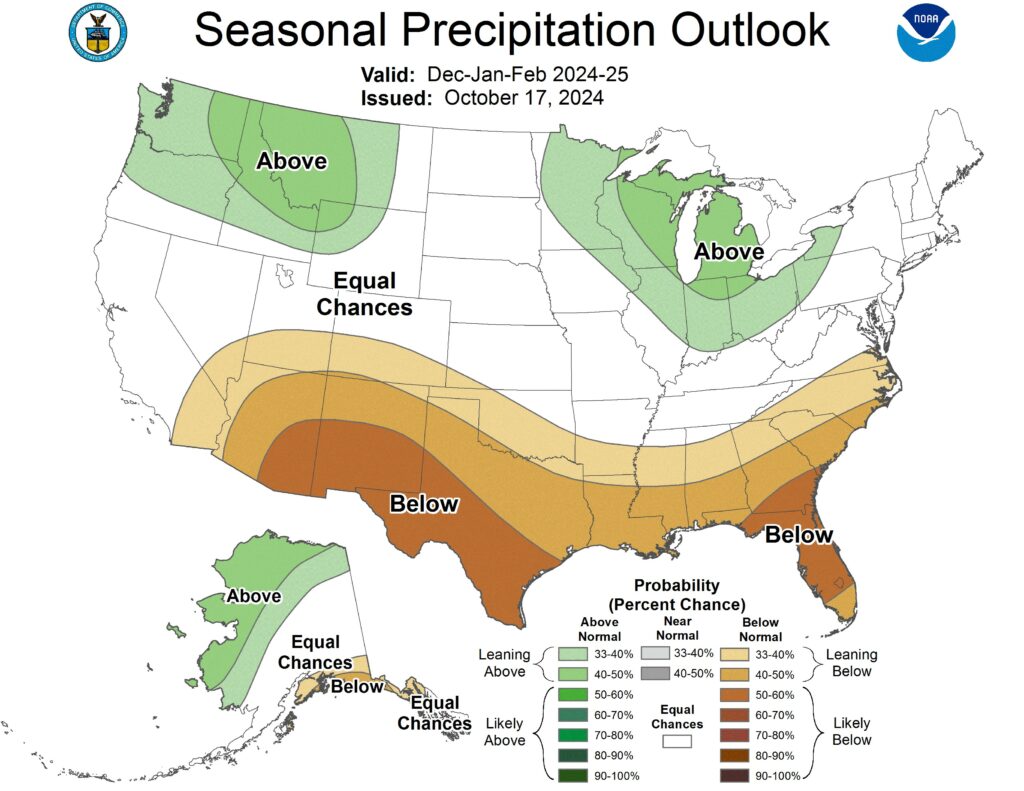In brief: This post offers a look back at our very warm fall, and asks whether this warmer pattern is likely to carry over into the winter. Spoiler: the answer is most likely yes. However that doesn’t entirely preclude one or two sharp cold snaps this winter. At the end of the post, be sure and check out some winterization tips for your home from our partner, Reliant.
So far this fall in Houston has not felt very fall-like, especially the daytime temperatures. I did a little bit of digging this morning, and found that in all of its records dating back more than 120 years, Houston has never had a fall this warm, at least through early November. In this case, I’m defining fall in the meteorological sense, the months of September, October, and November.
This year, the average high temperature from September 1 to November 7 has been 90.7 degrees. In case you were wondering, no, the average high temperature for this period has never been above 90 degrees before in Houston. The graphic below, for simplicity’s sake, only shows the average high in Houston since 1970, when the city’s official temperature station moved to Bush Intercontinental Airport. But the bottom line is that, in our recorded history, Houston has never been this hot during the fall. And yes, this is the type of pattern we would expect in a warming world.

The question then, is this: If fall has been so warm, can we have any expectation of a meaningful winter? Will it snow? Will it freeze? Here, then, is our winter outlook for the period of December, January, and February.
Winter outlook
We’ll start with La Niña, since forecasters are fairly confident that at least a modest cooling of the Pacific equatorial waters will set in during the coming months. The threshold for La Niña is -0.5 degrees C, and this is expected to persist during the winter months.

When we see La Niña developing during the winter months for the northern hemisphere, that tends to have fairly predictable effects for the United States. In Texas that means warmer-than-normal temperatures and drier weather. Essentially, we can expect more of the fairly shallow fronts that Houston has experienced so far this fall, with only glancing blows of cooler air.

In terms of precipitation, this generally calmer pattern should also lead to lower-than-normal rainfall. That’s not ideal, since parts of our area are still in a moderate drought. However, our rains over the last week, and additional showers this weekend, leave us in a lot better posture than we were before. The bottom line is that we can generally expect a mild and dry winter.
However—and there’s always a but in meteorology, it seems—there is one caveat to this forecast. Because of the way this pattern sets up, it will block much of the colder Arctic and Canadian air from the lower United States for most of the winter. But that does not exclude the pattern breaking one or two times. If that happens, and it probably will at least once this winter, there will be a large pool of much colder air available to dip down into the southern United States, including Texas.

So just because we anticipate a mild winter, it does not necessary mean we won’t see a freeze, or even a hard freeze with some freezing rain or snow from an Arctic blast. Finally, since I know someone is going to ask it, no the landfall of Hurricane Beryl this summer does not necessarily mean it’s going to snow this winter. We looked into that old wives’ tale a few years ago, and found the odds of snow in a post-hurricane winter are perfectly identical to the odds of snow in any other winter. On average we snow about once every four years.
A message from Reliant
Now is a great time to prepare your home for cooler seasons and prioritize HVAC and home maintenance. Similar to summer, a few conscious choices can make a big difference in your winter electricity bill.
These simple home improvement projects can be done now before winter arrives:
- Get an annual heater tune-up. Make sure your furnace or heat pump is clean and in good working order, so that it can run as efficiently as possible.
- Seal air leaks, commonly around windows, doors, and attics. Weatherstrip exterior doors and add caulk to windows. This helps keep indoor air in and outdoor air out.
- Install an electric water heater timer. This can prevent your water heater from running when you don’t need it.
- Inspect insulation. The best way is to hire a professional to check the insulation throughout your house. If needed, add more to better regulate your home’s temperature and reduce heating costs.
- Have your chimney inspected. Plus, be sure to keep the chimney damper closed when it is not in use.
Reliant provides 24/7 support to customers via phone and online chat. Looking for more winter tips to lower your electricity bill? Visit reliant.com/wintertips.

Winter 2024-2025 forecast : PFFFFTTTT!!!
How far north will I need to go to have a decent Christmas week?
Given that it was just 81 degrees in New York City, probably Duluth MN.
I was in NYC last week and day temps were in the low 60s for most of the week I was there, I don’t think those 80 degree days are going to last much for that region lol.
Feet of snow this week in New Mexico, that’s not far.
Move to Amarillo or Dalhart 🙂
Its great news that our new president intends to cut climate preservation initiatives. Surely that puts us on the right track given the observable warming trends.
Well now that Trump is back in office the liberal government won’t have to use their bad-weather machine to send hurricanes to conservative areas so we should be fine.
(This is sarcasm)
What climate preservation initiatives? Electric cars are a total farce. Vance is right: the best, most practical way to reduce global emissions is to stop buying from China and make thing in the USA. Also, to support nuclear energy, which I am pretty sure our new president does.
Also, speaking of electric cars, I recently heard new lithium deposits were found in Arkansas. Three guesses as to which party will be pushing to prevent their extraction in the name of protecting the environment, even as their pet policies encourage unregulated extraction in third world countries via slave labor.
Psst, the left advocates for expanded public transportation, not electric cars.
Earth has both warmed and cooled dramatically over millions of years. The ancient coastline has been both higher and lower than where it is today long before the Industrial Revolution. Lastly whether you like it or not oil and gas production is necessary even to power your Tesla and we do it much cleaner here than anywhere else in the world.
Yes that is true. Nobody is saying that the Earth has never warmed or cooled naturally throughout its long history. It is the rate of warming today that is the problem. Excluding dramatic effects from massive volcanoes or astroid impacts, the natural changes to Earth’s climate in the past took several thousands of years to occur not 200 years. The Earth is currently warming at a rate much faster than it has before and all the available evidence is overwhelmingly pointing to excess greenhouse gas emmisions like C02, Methane etc. Most species on Earth will not be able to adapt quick enough from the rapid warming we are causing today.
And to much greenhouse gasses was responsible for some of the hottest and most inhospitable times in Earth’s history btw. Except those greenhouse gas emissions were caused by frequent volcanic eruptions. Today it is caused by us.
salty much
Why cant we ever just have a cool, mild winter? Why do they all have to be like 80s all the time except for one week where it gets to 15 degrees and kills all my plants??
Because the polar jet stream has been gradually shifting further north and staying there longer during the winters over the past couple of decades. That is a direct result of climate change.
Amen brother. Why do we live here again? sigh. looks sadly out window until it fogs up
I will just go donate all my jackets and coats. There’s really no need for them anymore..
The deniers can’t say it’s just summer right now.
Depressing article.
Christmas in shorts. 🩳 Got it. I need to buy a Santa Claus with a Hawaiian shirt and sandals this year. It fits us better. 😆
Even during our warmest winter on record of 2016-2017 we still had a few really cold days including a cold snap in early January which dropped low temperatures down into the low 20s on the 7th and 8th.
The coldest arctic outbreaks over the last 50 years were in La Niña winters. 1983, 1989 and 2021 all had record cold snaps…
Yep, and in 2011 as well.
One or two strong fronts?? Are we going to be this humid the whole damn time? Wow. What a stupid year (for many reasons). 😑
It’s just disgusting. Before ya know it it’ll March!
As one of the things getting axed is NOAA, how will you maintain a free and accurate source of data impacting our weather? Will you go behind a paywall or cover the page in advertising? This may be a complex question to approach apolitically in the coming months.
Tropical Tidbits
re climate change. whatever the history, we’re here to be experiencing it directly this time